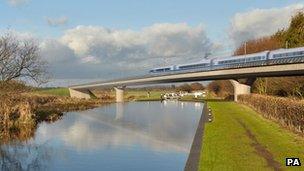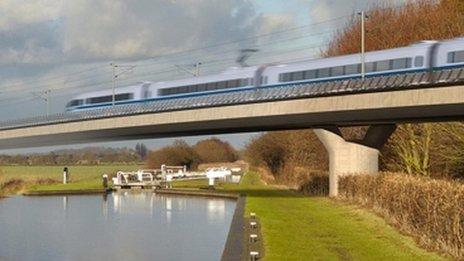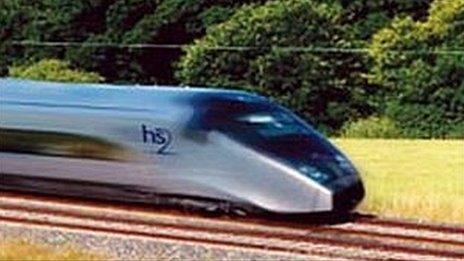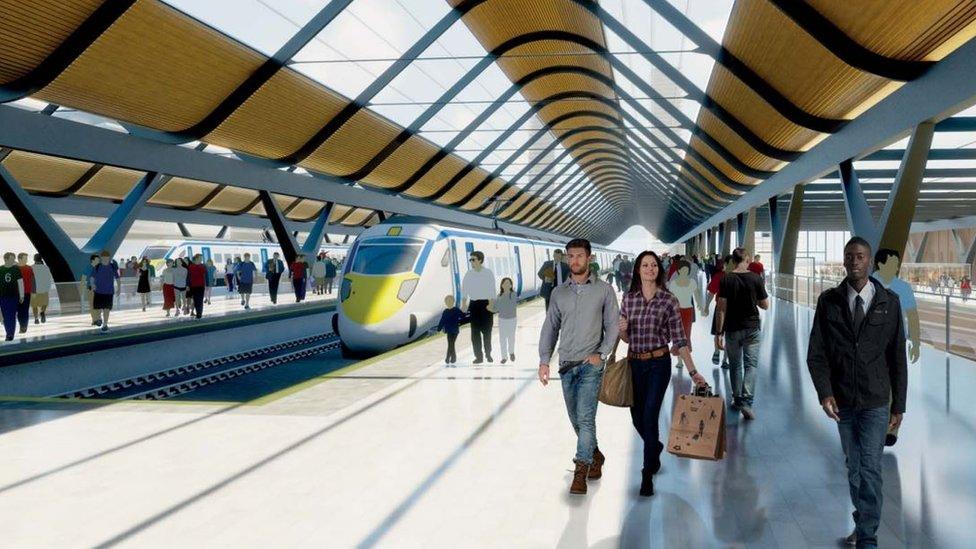HS2 rail alternatives no solution, MPs say
- Published

The 90-mile first-phase of HS2 would be built between 2016 and 2026
Alternatives to the High Speed Two (HS2) rail link would not solve the capacity problems on Britain's railways, MPs say.
A report by the Parliamentary Inquiry into Britain's rail capacity says only the high-speed rail network can create the extra capacity needed.
The MPs found that alternatives, such as incremental upgrades to the existing network, would not be sufficient.
Opponents of HS2 say the report looked at a "limited" set of alternatives.
In January, the first phase of HS2 was given the go-ahead by the government, despite strong opposition from campaigners opposed to the environmental damage they say it will cause.
Phase one, between London and Birmingham, should be running by 2026, with the rail link later extending to northern England.
The report is the culmination of a four-month inquiry by the All-Party Parliamentary Group for High Speed Rail, with representatives from all three of the main political parties.
The group saw submissions from 60 stakeholders within and outside of the rail industry.
A panel of MPs took evidence from 11 witnesses during two inquiry sessions.
The report concludes that:
• The rail network is close to being full as passenger numbers predicted for a decade's time are currently being reached
• Railways are seeing growth at over 5% despite the recession.
• Alternatives to HS2 would not meet peak demand, and would do little to help local services or freight
• The risk of under-providing capacity are severe and are much more serious than the risks of over-providing
The HS2 rail route from above
Graham Stringer, co-chairman of the parliamentary group, said that claims that "piecemeal upgrades" of existing lines can create sufficient capacity have been proved wrong.
He added: "All of the available evidence makes clear that the very running of our railways is under threat as we fast approach total saturation on some of the major trunk lines.
"HS2 remains the only proper and practicable solution to creating sufficient long-term capacity for Britain's railways."
Penny Gaines, chairwoman of campaign group Stop HS2, said: "The writers of the report appear to have looked at the issue through... a very narrow set of filters, and compared a very limited number of alternatives."
She added that the growth in "telepresence videoconferencing", which she said was reducing the number of long-distance journeys over all modes of transport, had not been taken into account.
Chris Howe, director of HS2 Northwest, said that the group agreed with all the findings presented by the report.
"The alternatives fail the northwest on capacity grounds. HS2 is a crucial lifeline for the north-west and midlands."
- Published10 January 2012

- Published27 April 2012

- Published6 October 2023
